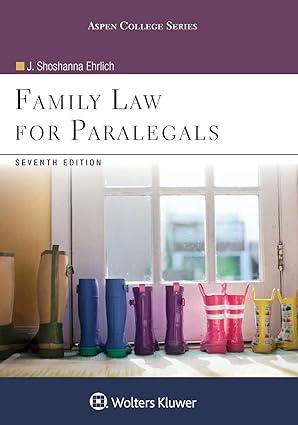The record supports the following facts. The petitioner filed for divorce from the respondent on grounds of
Question:
The record supports the following facts. The petitioner filed for divorce from the respondent on grounds of irreconcilable differences. He subsequently moved to amend the petition to assert the fault ground of adultery under RSA [Revised Statutes Annotated] 458:7, II. Specifically, the petitioner alleged that the respondent has been involved in a "continuing adulterous affair" with the co-respondent, a woman. The correspondent sought to dismiss the amended petition, contending that a homosexual relationship between two people, one of whom is married, does not constitute adultery. Before addressing the merits, we note this appeal is not about the status of homosexual relationships in our society or the formal recognition of homosexual unions. The narrow question before us is whether a homosexual sexual relationship between a married person and another constitutes adultery within the meaning of RSA 458:7.
II.RSA 458:7 provides, in part: "A divorce from the bonds of matrimony shall be decreed in favor of the innocent party for any of the following causes:
II. Adultery of either party." The statute does not define adultery. Id. Accordingly, we must discern its meaning according to our rules of statutory construction.
The petitioner also argues that "public policy would be well served by applying the same law to a cheating spouse, whether the promiscuous spouse chooses a paramour of the same sex or the opposite sex." This argument is tied to the premise, as argued by the petitioner, that "the purpose underlying [the adultery] fault ground is based upon the fundamental concept of marital loyalty and public policy's disfavor of one spouse's violation of the marriage contract with another." We have not, however, seen any such purpose expressed by the legislature. As noted above, the concept of adultery was premised upon a specific act. To include in that concept other acts of a sexual nature, whether between heterosexuals or homosexuals, would change beyond recognition this well established ground for divorce and likely lead to countless new marital cases alleging adultery, for strategic purposes.....
Questions:
1. According to the court, why did the wife's conduct not come within the meaning of the term "adultery"? What did the court look to in reaching its decision?
2. Why did the dissent disagree with the majority's conclusion?
Step by Step Answer:






